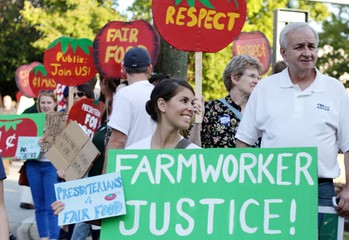Asheville, Durham, Chapel Hill, Charlotte and Raleigh – the five stops on the Fair Food Nation tour in North Carolina the past week and a half. The Coalition of Immokalee Workers (CIW) from Florida took part in what has been called the Publix Truth Tour, raising awareness about the poverty and exploitation faced by farmworkers.
Publix is a Florida-based supermarket chain with stores across Florida, Georgia, Alabama, Tennessee and North and South Carolina. The CIW has argued that farmworkers, who pick the vegetables sold in its stores, are living below the poverty line and face exploitation and sometimes slavery conditions.
Through its Fair Food Program, the coalition urges companies like Publix to pay an extra penny per pound for every pound of tomatoes they buy from growers and only purchase from farms that implement a code of conduct on workers’ rights.
“It appears the public has been very receptive to the tour. The coalition has such a compelling message,” said Andrew Kang Bartlett, associate for National Hunger Concerns with the Presbyterian Hunger Program. “When people learn how farmworkers are mistreated, threatened or sexually abused, they’re motivated to take action.”
The Presbyterian Hunger Program (PHP) has long supported the CIW and the Fair Food Program helping organize events, find churches that are willing to host the group and encourage Presbyterians to participate in the rallies and demonstrations.
“With the expansion of the Fair Food Program to other states outside of Florida, Presbyterians have even more opportunities to get involved throughout the southeast,” said Kang Bartlett. “There’s an ongoing campaign with Kroger, but most of the energy is currently being focused on Publix and fast food chain Wendy’s.”
In addition to the rallies, the CIW scheduled screenings of the James Beard award-winning documentary Food Chains, which details the Immokalee workers’ struggles to survive on poverty wages while facing unfair working conditions. Kang Bartlett says the film does an incredible job of giving the public an intimate sense of what the lives of farmworkers are like.
“They awaken at 4:00 a.m., get on buses and then wait in the fields until the plants are dry enough to begin picking, knowing they’re not getting paid for any of that time,” he said. “It’s a great way to bring the reality of farmworkers’ lives straight into the public’s conscience.”
The CIW Fair Food Program has become even more effective with the establishment of third party monitoring by the Fair Food Standards Council, which launched in November 2011. The Council audits participating growers’ farms, investigates workers’ complaints and enforces the Fair Food Code of Conduct. CIW officials say the program has contributed more than $15 million to Florida tomato farms’ payrolls, which goes directly into the paychecks of the farm workers. Walmart, Burger King, Taco Bell and McDonalds are among program participants.
Despite the five-city tour and demonstrations, Publix has not budged on its position saying it’s a labor issue not connected with the chain itself.
“They’ve been fairly consistent about not wanting to go further and join the Fair Food Program,” said Bartlett. “But under the surface, I can’t imagine they’re not feeling the pressure to join with Walmart and others in the same region and ensure the proper treatment of workers in the supply chain.”
November 21 has been designated as a National Day of Action on behalf of the Fair Food Program. Coalition representatives and allies, including the Presbyterian Hunger Program, will participate in actions around the country to call on Wendy’s and Publix to commit to the human rights of farmworkers and their families. PHP is encouraging Presbyterians, seminary students and professors and other concerned citizens to participate.
-----
Learn more here about the Day of Action.
For more information about the Publix campaign, click here.

